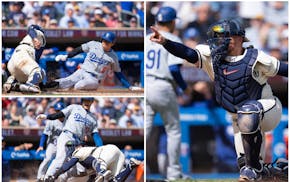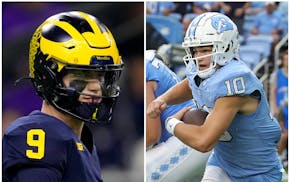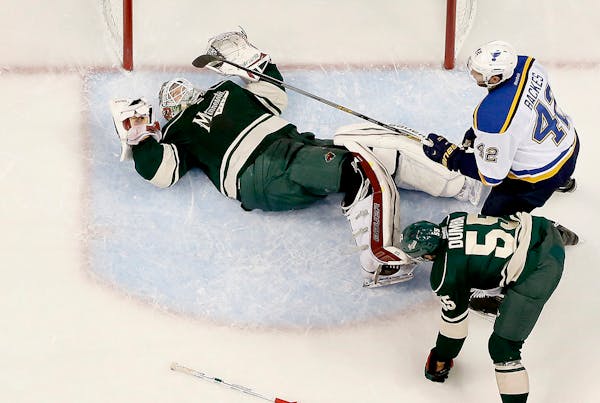Well, at least we know how the Wild responds to playoff prosperity, to praise, to being in the driver's seat of something important.
Shield your eyes. It's not pretty.
The guys in green treated their big moment like an airplane vomit bag. Actually, that's an insult to vomit bags.
The Wild had a chance to back the St. Louis Blues into a tight corner Wednesday night. A chance to take a commanding 3-1 series lead and cause the Blues to start contemplating tee times.
The Wild had momentum from a dominating performance in Game 3. Even if coach Mike Yeo refused to use that exact word, that's precisely how his team looked on Monday.
The Blues looked slow, disinterested, frustrated, a lot of different things.
But finished?
Hardly.
The Wild made sure of that with a 6-1 dud in Game 4 that included a mixture of boos and Bronx cheers inside a deflated Xcel Energy Center.
"There's no excuses for that one," captain Mikko Koivu said. "That's on us."
To fully grasp the opportunity lost with that stinker, consider that 90 percent of teams that have grabbed a 3-1 series lead in Stanley Cup playoffs history have won the series. Yet with so much at stake and the home building bursting to the rafters in anticipation, the Wild came out flatter than Kansas.
The Wild didn't just lose. It didn't even bother to show up.
Seriously, what the heck was that?
"We might have came in a little cocky," Zach Parise said. "We felt really good and rightfully so. I don't know if we thought it was going to be an easy game or we thought they were going to pack it in, but that wasn't the case at all."
The Blues led 3-0 before fans could finish a beer, and the mood in the arena went from electric to facepalm.
The Wild showed temporary signs of life after Jared Spurgeon scored on the power play early in the second period. But the air rushed out of the building again after Paul Stastny squeezed a shot between Devan Dubnyk's legs less than two minutes later.
Goodnight, thanks for coming.
"Not a lot of fun, that game," Yeo said.
Mocked and ridiculed after a lazy Game 3, the Blues answered challenges to their pride. The Wild, in turn, responded with discombobulated hockey.
The Blues pounced from the opening faceoff. Everything about the Wild appeared disjointed and marked by a stunning lack of urgency.
Turnovers, sloppy passes, awful goaltending by Dubnyk. There was not one positive aspect of their performance.
And so now the series is square again, 2-2. Momentum shifts to the Blues and it's the Wild's turn to face questions about its confidence.
The mood around the Wild will turn restless, but this series isn't over, just as it wasn't over after the Blues lost in Game 3. Anyone who thought otherwise sold the Blues short.
From the start, the teams looked so evenly matched that it felt like a seven-game series in the making. That still seems like a possibility, as dismal as Game 4 went for the Wild.
The Wild has to regroup, though. Players did so many things out of character and played so uninspired that one wonders if this is something they'll get over quickly, or if there will be some residual effect.
At least we can finally stop talking about Steve Ott's antics.
The Wild hadn't been in this position very often. Usually, the team is in chase mode, either in the regular season or postseason, always playing catch-up.
A series lead with a chance to put the Blues on thin ice gave them a different view, and the Wild simply tossed it aside.
Dubnyk, the season-saver, had his worst performance in a Wild uniform, allowing six goals before being lifted for Darcy Kuemper. Dubnyk gave up particularly soft goals to David Backes and Stastny as the deficit snowballed.
Dubnyk's struggles will be highlighted and dissected, but this was a collective failure. The Wild simply failed to show up as a team, and the Blues countered with big performances from their top players.
The series returns to St. Louis with a different tone. The Wild could've made the trip in control of this series. Now, the Blues should feel good about themselves after reclaiming home-ice advantage.
"We weren't good enough," Koivu said.
That was an understatement.
Chip Scoggins chip.scoggins@startribune.com

Scoggins: Finch feeling heat of the Suns as playoff battle looms
Scoggins: Why 'championship or bust' fits these Wolves

Scoggins: Anatomy of a game-saving play as Correa throws out Ohtani


